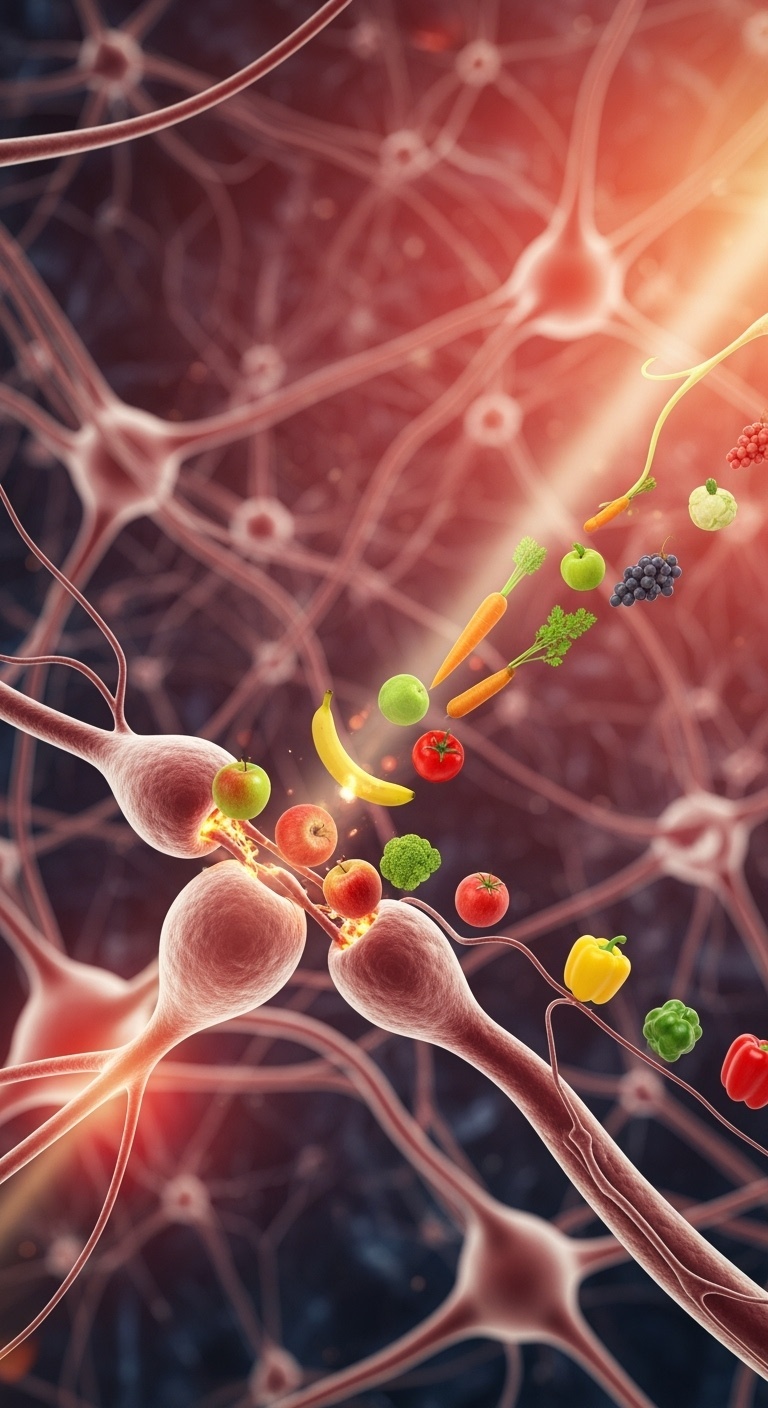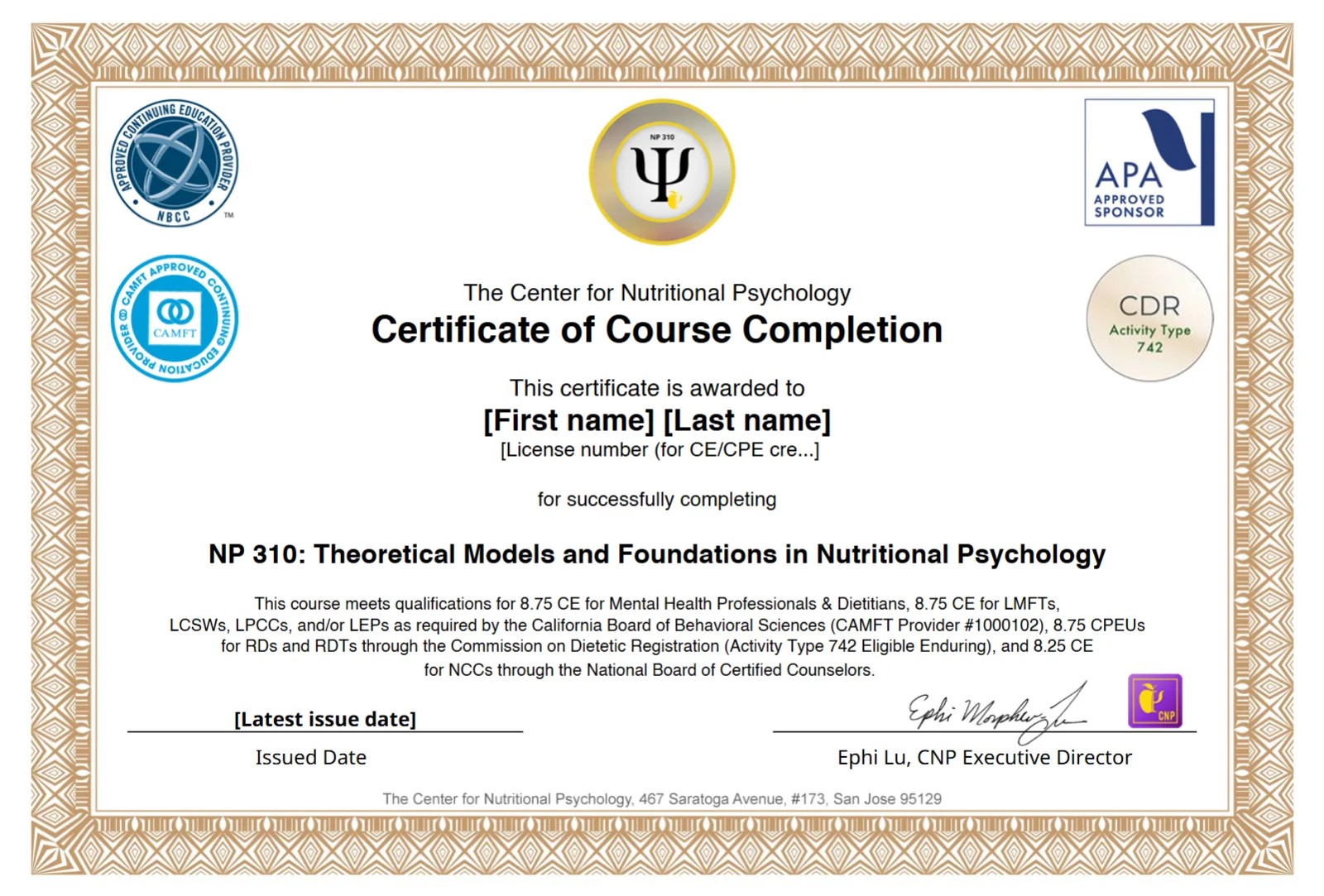 Navigation
Navigation


This course shows how nutritional psych is situated within the psychological sciences, while interconnecting with the nutritional sciences. It truly interconnects nutrition with mental health! NP Learner
This course is designed for professionals, academics, researchers, educators, and others interested in exploring the theoretical foundations of Nutritional Psychology (NP) within the broader field of psychology. NP integrates psychological, neurobiological, and social theories to examine the multifaceted connections between diet, behavior, cognition, emotion, social experience, interoception, and mental health.
By establishing its theoretical basis within the psychological sciences, this course highlights key intersections between the psychological and nutritional sciences. Participants explore foundational models in personality, motivation, emotion, cultural influences, attachment, and behavior change, all of which are relevant to understanding how dietary factors impact psychological health and well-being.
NP 310 introduces a curated selection of major psychological theories and integrative frameworks that underlie the field of NP. These include:
Through this comprehensive approach, learners gain a deep understanding of how psychological theory contributes to the emerging discipline of Nutritional Psychology and how these theories support real-world interventions in eating behavior, mental health, and dietary behavior change.
In this course, we explore many key theories, examples of which are:
NP 310 is a cornerstone in CNP’s Nutritional Psychology Certificate in Theoretical Foundations (NP-F) in Nutritional Psychology. The NP-F Certificate includes:
Together, these courses provide an integrated foundation for those seeking to teach, research, or apply NP in academic, clinical, or applied settings.
This course is fully online, self-paced, and text-based, with figures/diagrams, powerpoint presentations, and short animated videos. This course has a syllabus, four modules, quizzes, one final exam, and a course evaluation. The pace at which you complete this course will depend on your personal reading, comprehension, and learning style. See the Course flyer: APA/NBCC/CDR or CAMFT).
Once enrolled, Learners have full online access to this course for 3 months (90 days). This course and evaluation must be completed to receive course credit and an NP 320 Certificate of Completion. No partial credit is given. This course is not downloadable. However, for each module, Learners may download a Module Download Kit containing all of the terms & definitions, figures, evidence-based factoids, and APA-formatted references.
OPTIONAL DOWNLOADABLE WORKBOOK Available! This course offers a companion, optional downloadable workbook that provides an interactive learning document with an answer key, designed to reinforce key concepts. Purchasing this workbook provides an additional 3 CE for 49 USD and serves as a valuable learning tool. Learners complete the workbook, email it to the course instructor for review and approval, and receive notification of completion and CE.
CNP is approved to sponsor Continuing Education (CE) for professionals through the following organizations:
NP 310 provides 8.75 CE for Psychologists, RDs, DTRs, LMFTs, LCSWs, LPCCs, and LEPs, and 8.25 CE for National Certified Counselors (NCCs). For NCCs, the National Board of Certified Counselors excludes learner time spent on syllabi, quizzes, and the course final. Please contact the NBCC should you have questions.
Once enrolled, Learners have full online access to this course for 3 months (90 days). This course is fully self-contained, and no additional materials are needed for its completion. This course and evaluation must be completed to receive course credit and an NP 310 Certificate of Completion. No partial credit is given. This course is not downloadable. However, for each module, Learners may download a Course Download Kit containing all of the terms & definitions, figures, lightbulb moments (short evidence-based factoids), and APA-formatted references. You may also purchase the optional 3 CE Downloadable Workbook for further learning and support.
CNP maintains responsibility for this program and its content. CNP, the organization offering this course, is committed to ethical standards, resolving conflicts of interest in its programs, and ensuring unbiased, evidence-based education. Registering for NP 310 indicates that you have read and agreed to CNP’s Course Policy.
CNP is committed to identifying and resolving potential conflicts of interest in planning, promoting, delivering, and evaluating its continuing education curriculum and programs. As an APA-approved continuing education sponsor, and consistent with concepts outlined in the APA Ethical Principles of Psychologists and Code of Conduct, no individual involved in the planning, promotion, delivery, or evaluation of CNP continuing education has any personal, professional, legal, financial, or other interests that could reasonably be expected to impair his, her, or their objectivity, competence, or effectiveness.
There are no prerequisites to take this course, which is part of the Theoretical Foundations Certificate in Nutritional Psychology (NP-F). The newly developed NP-F includes NP 110: Introduction to Nutritional Psychology Methods and NP 320: Neurobiological Foundations in Nutritional Psychology.
This course presents evidence, knowledge, and conceptual learning in the form of psychonutritional education on important psychological processes underlying diet-related behaviors within NP. This course does not provide:
This course provides knowledge of:
A: Yes, this course is taught fully online through the CNP educational platform and can be completed at your own pace. Note: once enrolled, each course has a time limit to complete (usually several months and in NP 310 case -- three months).
A: Yes, NP 310 has open enrollment, and you can begin any time.
A: NP 310 is estimated to take 8.75 hours to complete (or 8.25 if you are a National Certified Counselor). Of course, this also depends on your learning style and previous experience in nutrition and psychology and whether you've taken previous CNP courses. If this information is new to you, or you are a deep learner, it may take more time to complete.
Hedrih, V., Reiisieh, S. (2025). Theoretical Models and Foundations in Nutritional Psychology [Online course]. The Center for Nutritional Psychology. https://www.nutritional-psychology.org/np-310/
A: Yes, a description of the conceptual framework of nutritional psychology can be found in this paper: Stroebele-Benschop, N., Hedrih, V., Behairy, S., Pervaiz, N., & Morphew-Lu, E. (2025). Conceptual Framework for Nutritional Psychology as a New Field of Research. Behavioral Sciences, 15(8), 1007. https://doi.org/10.3390/bs15081007
"This course will definitely help me in my study and practice. I have an interest for the subject and understood the key role and importance of our dietary patterns and mental health. I now know specifics to integrate in my life and practice, to help clients, patients, students, family and friends. It validates my values and desires to learn and support others with this information, helps me help people to have conscious and awareness of their dietary intake and how much it affects their lives."

This course provides 8.75 CE for Psychologists, Registered Dietitians (RDs), Dietetic Technicians, Registered (DTRs), Licensed Marriage and Family Therapists (LMFTs), Licensed Clinical Social Workers (LCSWs), Licensed Professional Clinical Counselors (LPCCs), and Licensed Educational Psychologists (LEPs), and 8.25 CE for NCCs (National Certified Counselors). To receive credit for this course, learners must complete the course in its entirety and the course evaluation.
 NP provides university-level, evidence-based Continuing Education (CE) for professionals seeking to deepen their understanding of the relationship between diet and mental health.
NP provides university-level, evidence-based Continuing Education (CE) for professionals seeking to deepen their understanding of the relationship between diet and mental health.
By integrating the latest research in nutritional psychology, CNP ensures that its courses are rooted in scientifically validated principles, offering a comprehensive and credible foundation for practice. This commitment to evidence-based education empowers healthcare providers, mental health professionals, nutritionists, and educators to apply cutting-edge insights to their work, bridging the gap between nutrition and psychological well-being.
CNP is approved to sponsor CE for psychologists, mental health professionals, counselors, dietitians, nutritionists, and other professionals whose licensing bodies accept CE from APA, CDR, CAMFT, and NCC. CNP maintains responsibility for this program and its content. If finances are a barrier to accessing our curriculum, see our NP 110 Scholarship Program.

CNP is approved to sponsor Continuing Education for:
The information in this course is not meant to, nor should it ever be used, to treat, mitigate, or cure psychiatric illness. This information should never be used as a substitute for sound medical advice. This course is educational in nature and is designed to introduce professionals, students, and interested individuals in developing their understanding of the connection between diet and all aspects of psychological functioning and mental health. Best practices for how to integrate this information professionally, ethically, and within the standards of practice will be covered in upcoming courses. While this information can be incorporated into one’s practice within an educational framework, it cannot be used to provide dietary advice, any form of dietary intervention, or to treat any psychological or mental health issues.